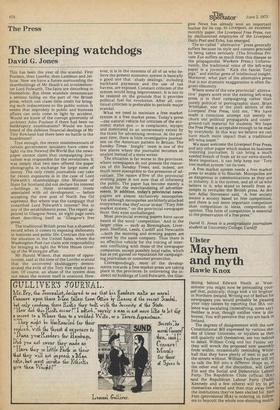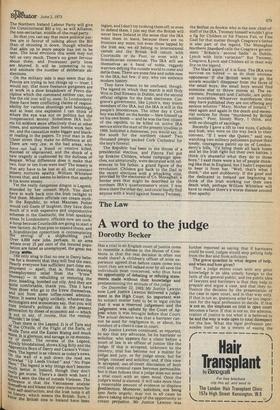Ulster
Mayhem and myth
Rawle Knox
Sitting behind Edward Heath at Westminster you might now be persuading yourself that, politically, things look a bit brighter in Northern Ireland. Writing out of Belfast for newspapers you would probably be, pleasing your copy tasters by reporting that IRA violence was escalating (intensifying, some say). Neither is true, though neither view is dishonest. You will perceive that you are back in Ireland.
The degrees of disagreement with the neW Constitutional Bill expressed by various shades of Ulster Unionists, or loyalists as they still quaintly call themselves, are too tedious to detail. William Craig and Ian Paisley say they will wreck the proposed new assemblY from within, occasionally reminding Whitehall that they have plenty of men to put on the streets without. William Faulkner will trY to talk the Bill into a different shape as, at the other end of the discordion, will Gerry Fitt and the Social and Democratic Labour Party. The Republican Clubs (official IRA), sand the Republican Labour Party (PaddY Kennedy and a few others) will try to get themselves elected and then stay away from the institutions they've been elected for. Sinn Fein (provisional IRA) is ordering its followers to boycott the whole non-shooting match.
The Northern Ireland Labour Party will give the Constitutional Bill a try, as will Alliance, the non-sectarian, middle-of-the-road party.
So that you can say that more political parties are in favour of talking about the Bill than of shouting it down, though whether that adds up to more people has yet to be seen. The local elections this week may not tell us very much. There's no great fervour about them, and Protestant party lines are blurred. It will be interesting to try and estimate the number of deliberate abstentions.
On the military side it may seem that the Provos are trying to hot things up — truer, I would say, that more freelance gangsters are at work in a slow breakdown of Provo discipline which the command neither can, nor has the old iron will to, stem. In Londonderry there have been conflicting claims of responsibility for various shootings and bombings, • and at least one explosion I can think of where the eye was not on politics but the compensation money. Sometimes IRA bull ets hit soldiers more effectively than at other times, and sometimes their bombs work bet ter, and the casualties make bigger and black er reading in the papers. To your man in the Ulster street they make no difference at all.
There are very :ew, in the bad areas, who have . not 'Fiala a -friend or relative killed, maimed or imprisoned, and the shock of a new tragedy is cushioned by the dullness of despair. What difference does it make that two, four or ten lives were lost? The misery is that any have to be lost at all, and constant misery nurtures apathy. William Whitelaw knows that, and seems to believe that apathy IS his worst enemy. Yet the really dangerous dragon is Legend, attended by her consort Myth. You don't have to walk back into the Irish twilight to find them. Modern officials can create myth. In the Republic, to what Maureen Potter would call Gaels of laughter, they have (lane much of it with expensive and unproductive schemes in the Gaeltacht, the Irish speaking areas. In Londonderry, officials now are cocka-hoop because Courtaulds are going to start a new factory, du Pont plan to expand theirs, and a Scandinavian consortium is contemplating th-e reviva,1 of a shipbuilding yard.' Over 4,000 new jobs, perhaps, in an area Where over 15 per cent of the insured population are listed as unemployed, the great majority waits. he only snag is that no one in Derry believes for a moment that they will find the men. Nearly everyone has sufficient part-time employment — apart, that is, from drawing unemployment relief from the "brew" (bureau) — in rebuilding or restoring the Poor, bleeding, bombed out city. And they are quite comfortable, thank you. This I have from those who go to the b'rew themselves, and not from some toffee-nosed administrator. It seems highly unlikely, whatever the sociologists and economists say, that you will cure Ireland's political ills in the present generation by doses of economic aid — which iS not to say, of course, that the remedy Shouldn't be tried.
Then there is the Legend. It is of Tara and _ef the O'Neills, of the Flight of the Earls, of Wolfe Tone and the Easter Rising and much i:nore. It is glorious; and savage in its monoto_eY of death. The reverse of the Legend, e, (Nally bloodstained, shows King Billy and the Pprentice Boys of Derry and Carson's Volun: ers. The legend is as vibrant as today's news. the wall of a pub down the road are terawled "Up Leeds United" and "No Pope "ere." The legend is why things don't become
rttueh better in Ireland, though they don't
kre kre ally get worse. There's a death wish here I "ven't seen the like of outside Vietnam. The Ithifeftnerence is that the Vietnamese analyse selves and blame their own characters for Laeir self-destruction, and the Irish lump it all okiLhistory, which means the British. Sure, I "o‘v the British sins in Ireland have been
legion, and I don't try to shrug them off, or even to defend them. I just say that the British will • never leave Ireland in the sense that the IRA want them to leave, because there are no frontiers any more, not even those lapped by the Irish sea; we all belong to international cartels and the British will return with Courtaulds or du Pont, or even with a Scandinavian consortium. The IRA still see themselves as a band of noble, raggedy warriors defying the outside world to come and defile them. There are some fine and noble men in the IRA, but few, if any, who can embrace modern history.
They have reason to be confused, though. The legend on which they march is still Holy Writ in Dail Eireann in Dublin, and the second official religion for the Irish electorate. Cosgrave's government, like Lynch's, may intern members of the IRA, but the IRA is still in the people's bloodstream. The other day a Cork boy was killed on the border — blew himself up on his own bomb — and he was the first citizen of the republic to be killed on active IRA service since the start of the present troubles in 1969. Indicates a disinterest, you would say, in the south for the northern cause? Two thousand people packed Cork Cathedral for the boy's funeral.
The Republic has been in the throes of a presidential election, and Fianna Fail put up Erskine Childers, whose campaign speeches, not unnaturally, were decorated with references to his father, a grand figure of the revolution. Childers got back to the Dail in the recent elections with a whacking vote, provided by the electorate of Co. Monaghan, a border area that might be described as the northern IRA's quartermaster's store. I was down there the other day, and could hardly find anyone with a word against Seamus Twomey, the Belfast ex-liookie who is the new chief-of staff of the IRA. Twomey himself wouldn't give a fig for Childers or for Fianna Fail, or Fine Gael for that matter though Cosgrave's father is also part of the legend. The Monaghan Northern Standard calls the Cosgrave govern ment " Britain's 'second fiddle ' in Dublin, Lynch with little variation!" But Twomey, Cosgrave, Lynch and Childers all in their way live on the legend. The black aspect of it is hate. The IRA now survives on hatred — as do their extreme opponents. If the British were to go the scowls wouldn't disappear from the faces of the small boys; the small boys would find someone else to throw stones at. The ex tremists, Protestant and Catholic, are political incurables. Whatever manifestoes they may have published they are not offering any serious solution "Mary, Mother of Ireland," I read again and again in the death and memo rial notices for those "murdered by British soldiers." Poor, bloody Mary, I think, and with no thought of sacrilege.
Recently I gave a lift to two nuns, Catholic and Irish, who were on the way back to their convent. "If I were the Queen," said one, watching two military policemen pursue their lonely, courageous patrol up on of Londonderry's hills, "I'd bring them all back home and let the Irish fight out their own battles. I think it's shameful what they do to those boys." I said there were a lot of people thinking like that in England, but I hadn't expected to hear it from her. "Well, that's what I think," she said stubbornly. If the good and the dedicated in Ireland are beginning to think of the Irish working out their own death wish, perhaps William Whitelaw will have to realise there's a worse disease around than apathy.



































 Previous page
Previous page